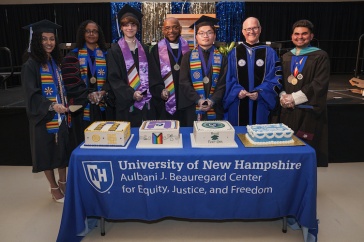
For nearly two decades, a unique Northeast Passage program has been changing veterans’ lives — and soon it will have an even greater impact.
A grant from the Bob Woodruff Foundation (BWF) will make it possible for PATH — Promoting Access, Transition and Health — to expand and serve more veterans in New Hampshire and beyond, right in their own communities. Northeast Passage (NEP) developed PATH to bring certified therapeutic recreational therapists to veterans in their homes, involving them in recreation and community activities. The PATH program is a working example of BWF’s mission to “ensure that our nation’s impacted veterans, service members and their families have access to the highest level of support and resources they deserve, for as long as they need it.”
Cathy Thompson, director of NEP’s home-based recreational therapy program, explains the BWF grant will allow NEP to share the PATH model with other organizations. Northeast Passage developed PATH in 1998 as part of a research study with individuals who had experienced spinal cord injury. Within seven years, the VA Medical Center in Manchester, New Hampshire, adopted it, and with an earlier BWF grant and other support, NEP expanded PATH to serve more than 600 veterans. “We are really invested in the integrity of the model to make sure they are going to get the same outcomes,” Thompson says. “We will be able to pilot the first round of training and supervision for agencies that are going to adopt this model.
In 2017 alone, 139 veterans took part in PATH, receiving 352 visits to their home communities, totaling 773 treatment hours. Thanks to the BWF award, Northeast Passage will be able to expand that work to New Hampshire’s North Country, Vermont’s Northeast Kingdom and other locations. “We have been leveraging our connections and resources and refining the model in-house,” Thompson says. “With this grant, we will have our first foray into mentoring other organizations and working with them to implement the PATH program.”
What sets the PATH program apart? Historically, recreation therapy has been based in inpatient, long-term care and rehabilitation centers and through adaptive sports programs. “These are a really important part of the options available to veterans, but people also need to make sure they know how to make those skills sustainable in their everyday lives, in their homes and the places that matter to them. We look at what the person wants to add to their life and what are the functional skills that are going to support that. It’s a collaborative process,” Thompson says. “We have, essentially, a helpful piece for the overall puzzle of veterans’ care that has a history of positive outcomes in their home and their home community so they don’t have to imagine how the skills they’re developing will be used.”

“Rural areas often feature fewer social opportunities and support services for veterans. By offering an avenue to accessing these resources, the PATH model is a great example of a program that is filling the gaps in an effort to ensure our veterans thrive in the next chapter of their lives,” notes Anne Marie Dougherty, executive director of the Bob Woodruff Foundation. “We are proud to continue supporting the great work Northeast Passage is accomplishing through its PATH model expansion.”
“This is exciting for not only veteran health and Northeast Passage, it’s also exciting for the entire field of recreation therapy, and UNH has been in the forefront of this particular field,” Thompson says. “Northeast Passage is proud to be part of the larger UNH community.”
For more than 28 years, Northeast Passage has been a nationally recognized leader in the field of therapeutic recreation, providing innovative solutions for individuals with disabilities.
Learn more at www.nepassage.org.
-
Written By:
Jennifer Saunders | Communications and Public Affairs | jennifer.saunders@unh.edu | 603-862-3585
















































